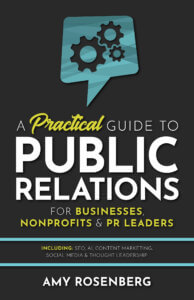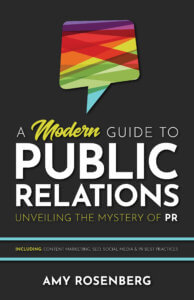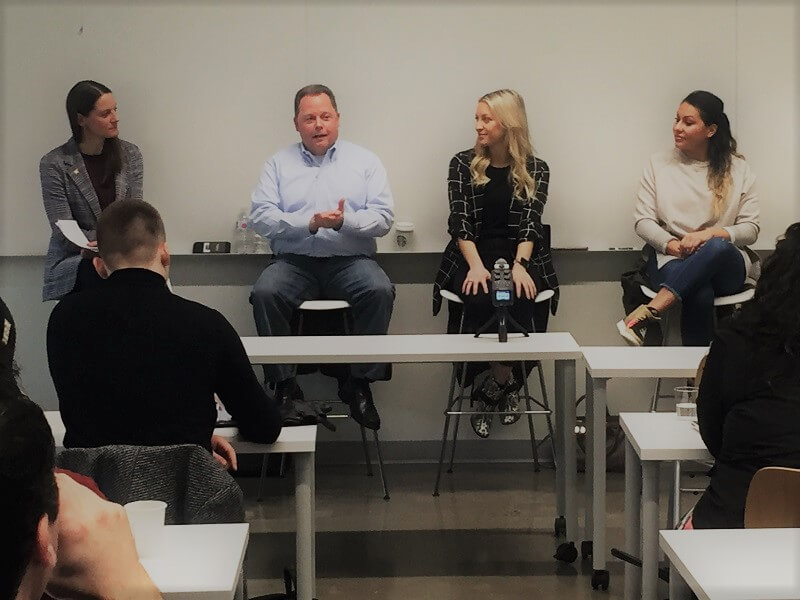
by Amy Rosenberg | Apr 10, 2019 | Industry News, Podcast, Public Relations
What Do Recruiters Want Anyway?
I recently got to be a fly on the wall during the “What Recruiters Want” panel, co-organized by PRSA Oregon and Portland State University. We heard from three recruiters in diverse — yet comfortably similar — areas, including: PR, digital marketing, and the footwear/apparel industries.
This PR Talk Podcast was recorded live at the event hosted by PRSA Oregon and Portland State University:
What Recruiters Want
Description:
The seasoned recruiters all had interesting insight to bring regarding the following topics:
- Resumes & Cover letters
- LinkedIn
- Tips / Do Not Do’s
- Soft Skills & Hard Skills
- Diversity
- And Much More!
Not only did they bring their experience as recruiters to the table, but they also drew from experience at previous jobs (especially at Nike!), rendering this insight invaluable for anyone who might be looking for a job.
Recruiter for Global Footwear and Apparel Clients at Mathys + Potestio/The Creative Party® (most recently an in-house recruiter at Nike)
Moderator:
The panel was moderated by Erin Merz, Director of Marketing & Communications at PSU’s School of Business and a PRSA Oregon Member.
This episode of PR Talk is brought to you by PRSA Oregon
Throughout Oregon and Southwest Washington, PRSA provides members with networking, mentorship, skill building and professional development opportunities – whether you are a new professional fresh out of college or a skilled expert with 20 years in the industry. Check out PRSAoregon.org for more information on how membership can help you grow and connect.
In such a fast-paced, multi-faceted work environment, it can be tough to stay on top of everything. monday is the collaboration tool trusted by businesses of all kinds to help cut down the clutter and streamline productivity. Learn more at monday.com and signup for a free trial. You’ll see in no time why so many teams around the world are choosing monday for their project management needs.
PR Talk listeners can use the coupon code BetterExecute for a 15% discount.
![Mac Prichard of Mac’s List [Podcast]](https://www.veracityagency.com/wp-content/uploads/Macs-List-PR-Talk.jpg)
by Mike Rosenberg | Mar 26, 2019 | Podcast, Public Relations
Network Your Way to a “Hidden” New PR Job
A few weeks back Amy talked with Mac about his firm Prichard Communications. In this episode, they talk about his other company Mac’s List. The job board and career guidance resource started as Mac simply sharing job postings he compiled with friends and colleagues. The original “list” has evolved into a useful resource for job seekers and employers. In addition to job postings, Mac’s List provides many free resources for those on the new job hunt, including a podcast, how-to guides, books and events.
Learn the skills needed to get a job
In addition to learning about the evolution of Mac’s List, this episode also delves into: skills for successful job hunting, landing a position in a new location without connections and Mac’s tips for first-time job seekers — specifically for those looking in the marketing industry.
Mac points out that most jobs are not posted publically, stating that only 20-30% make it to a job board like Mac’s List. Those positions, referred to as hidden jobs, are filled by internal promotions, referrals and networking (something we talked about with Dan Lee in a previous episode).
Leading us to ask: how do you get a job that never posts?
Finding the “hidden jobs”
Mac says that you need to start with investing time in goal setting and figuring out what you want. This advice applies to any career move, but it especially matters for the most coveted positions.
The next step is to spend time understanding how the hiring system works. In general, people hire those they know or they turn to others for recommendations, encouraging established connections to apply. But don’t get too excited. Connections will help you get in the room but you’ll still need to work towards getting the offer.
What this means for job seekers is that they need to put themselves in a position to be one of the potential candidates that is recommended, or at least made aware of the hidden jobs.
Tips for first-time job seekers and people looking to change industries
I asked Mac how new grads or first-time job seekers can land dream jobs. His response was very candid that they will not, saying that while their first job may not be dreamy (sorry millennials), if they spend time setting goals and mapping out how to eventually get to their dream job, they’ll ultimately have success. You get there by getting good at job hunting and thinking a few steps ahead. This will help you make better choices in your first few jobs, eventually enabling you to land your dream job
Have a plan in regards to who you need to get to know. Then put yourself in a position to connect with and interact with those people.
Is it a good time to find a job? How about specifically in Portland or communications?
We are in a job market with historically low unemployment. However, there are still 500 jobs per month on Mac’s List. It has also never been easier to apply for a job, oftentimes with just a click of a button. That means a lot of competition is applying through the front door.
However, those who have clear goals, know what they want, know what they have to offer and how the jobs market works shouldn’t have too tough of a time.
How do you find a job in a new city that you don’t know anyone in?
Mac talks about his own experience moving to Portland from Massachusetts. When he decided to move to Oregon, he built a network in Oregon before starting to apply. If you don’t know people in a city (or industry) you want a job in, you have to build a network in that location from afar. Mac mentions utilizing various networks like your existing contacts, alumni associations and good old LinkedIn. You need to build a map of the world you want to work in, determine who the leaders are in that market (geographically and within the industry) and then see who is hiring and build relationships with those people.
Learn more & network your way to a new job
Mac’s List provides plenty of opportunities for job seekers to learn more about the job market and how to be successful in your job search, including weekly newsletters, a podcast, lots of “how-to” blog posts and local events.
Upcoming Mac’s List event: How to Land Meaningful Work in Nonprofits, Thursday, March 28th at Reed College from 5:30 – 8:00 p.m.
Live in Portland (or want to get a job and move here)? Check out the FREE RESOURCE: 8 things you should do to get Portland job faster at macslist.org/prtalk
About the guest: Mac Prichard
Mac Prichard is the founder and president of Prichard Communications, which was founded in 2007. He has a master’s degree in public administration from the John F. Kennedy School of Government at Harvard University, and a bachelor’s degree in political science from the University of Iowa. His career experience includes working for both Earl Blumenauer and John Kitzhaber and founding a second company called Mac’s List.
Connect and follow Mac on social media:
This episode of PR Talk is brought to you by PRSA Oregon
Throughout Oregon and Southwest Washington, PRSA provides members with networking, mentorship, skill building and professional development opportunities – whether you are a new professional fresh out of college or a skilled expert with 20 years in the industry. Check out PRSAoregon.org for more information on how membership can help you grow and connect.
PR Talk is sponsored by monday
In such a fast-paced, multi-faceted work environment, it can be tough to stay on top of everything. monday is the collaboration tool trusted by businesses of all kinds to help cut down the clutter and streamline productivity. Learn more at monday.com and signup for a free trial. You’ll see in no time why so many teams around the world are choosing monday for their project management needs.
PR Talk listeners can use the coupon code BetterExecute for a 15% discount.
![PR Talent’s Dan Lee [Podcast]](https://www.veracityagency.com/wp-content/uploads/Dan-Lee-PR-Talk-on-PR-Talk-Podcast.jpg)
by Amy Rosenberg | Mar 18, 2019 | Podcast, Public Relations
Dan Lee Breaks Down the Local PR Job Market
This PR Talk episode features Dan Lee, managing director at PR Talent — a staffing firm focusing solely on filling PR and communications roles — with recruiters on the ground in key markets nationwide, including L.A., San Francisco, New York, the Pacific Northwest, Washington D.C. and Minneapolis-St. Paul. Before starting PR Talent’s northwest operation, Dan spent 16 years in Weber Shandwick’s Seattle office.
Dan came to Portland for a PRSA Oregon panel on “What Recruiters Want.” Which, of course, I recorded for a future episode as we’re doing a deep dive on communications jobs.
As you might imagine, Dan knows a thing or two about PR and the local hiring scene. So if you’re looking to make a career move or you’re with a company searching for skilled employees listen up, because Dan can help.
The Market is Great for Candidates, But Challenging for Employers
Communications jobs are notoriously hard to fill, and during our conversation, Dan took some time to explain why. To start with, technology and resume screeners have taken the human element out a process that requires a lot of human judgement. “For us as recruiters at PR Talent, one of our hallmarks really is trying to humanize this process as best as possible between the candidate and the client,” Dan said.
To make matters worse, many traditional recruiters don’t understand the skills candidates must possess to be successful in our industry. “Our career is very challenging,” Dan said. “It’s a foreign language, really, to most recruiters that haven’t done the work before.”
Add to that a very tight job market here in the Pacific Northwest, and that leaves many agencies in desperate need of good employees. Dan hears the same question again and again from his new clients: can you help us cut to the chase and bring some strong candidates to the forefront? “That’s where we jump in and end up partnering with the hiring manager and usually the internal recruiting team to make that happen,” Dan said.
While it’s a challenging time for hirers, candidates are enjoying a very exciting market for Northwest PR jobs. “Candidates are really driving the market,” Dan said. Salaries are increasing and Dan has about 10 mid to senior-level positions open, and a couple open junior roles as well.
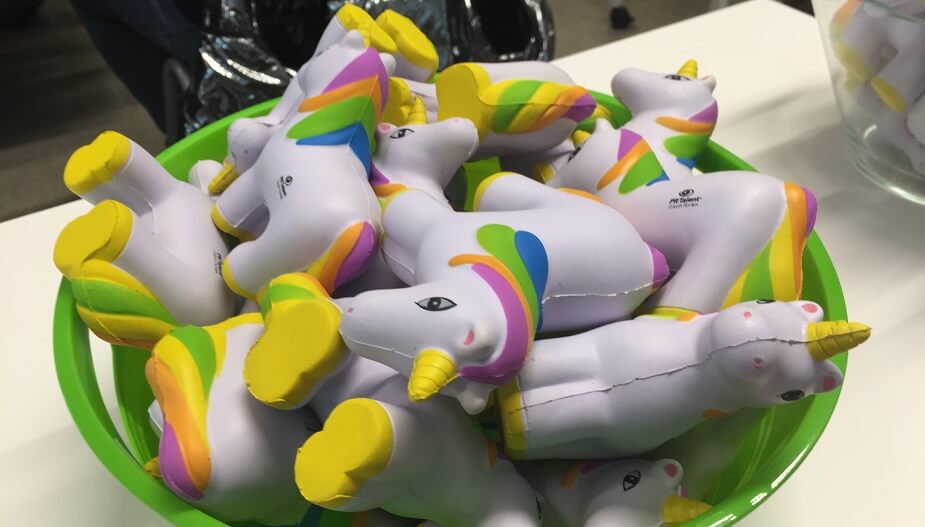
Are PR professionals unicorns? Do you have to have “it” to succeed?
Dan’s Tips for a Career Switch
So what should job seekers do to maximize their chances of getting an offer? While your cover letter and resume will always be important, candidates looking for a change in their PR job or to switch careers into the industry need to be intentional if they want to truly find success.
Dan said the first step is to recognize that the process is going to take time. So, it’s best to be proactive and do all the little things to prepare for your next change now, rather than waiting until you’re forced to look for a new job.
He said to start by asking yourself some questions:
- Where have I been and where am I going?
- What do I want to do and what is it going to take to do that?
As the saying goes, begin with the end in mind and work backward. So spend an hour or two per week updating your resume, cover letters and LinkedIn profile.
“You don’t want to be in a desperate situation looking for a job,” Dan said. “Because what will happen most of the time, is you’ll take the first thing that comes your way and then you’re going to be back out there looking again probably within the next six to eight months. So, try to be proactive, be intentional. Take the time and you can do it in steps. It doesn’t have to be done on a Sunday night.”
Employers Should be Intentional Too
In this market, employers can’t sit back and passively wait for applications to come in. So what steps should they take to find their next super-star employee? Besides giving Dan a call, employers should make sure they have their hiring process mapped out before posting a position on LinkedIn or another job board.
Hirers should ask themselves questions like:
- Who is going to filter through all the resumes?
- Who is making the first call?
- Who will be on the hiring committee?
- What do we want to know so we can compare apples to apples?
Employers that don’t take these extra steps end up looking unorganized and incompetent in front of candidates. And in a tight job market like ours, that can mean the better candidates choose to go to another company, simply because too many days went by between phone calls with your company.
“That is a big, big problem,” Dan said. “You have to be set up for success, and you want to make sure the candidate experience is positive all the way through, not only for who you eventually hire, but for all those that have interacted with your brand and organization, because it is a reflection and people talk. If they’ve had a bad experience, that word travels and if the role stays out there a long time, it’s going to be really hard to fill.”
Subscribe to PR Talk Today
Click the link to hear the rest of my conversation with Dan Lee — including his advice on managing a PR career and whether or not you have it as a PR person.
And don’t forget to subscribe to the PR Talk podcast on iTunes, Stitcher, and the Google Play store so you’ll never miss a new conversation. You’ll also gain access to our archive, which now contains more than 50 episodes, featuring many of the top names in PR and communication.
About the guest: Dan Lee
Dan Lee is a Managing Director at PR Talent and leads the firm’s recruiting efforts in the Northwest region. His career experience includes sports broadcasting, sports marketing, and 16 years with Weber Shandwick, where he was a vice president.
Connect and follow Dan on social media:
This episode of PR Talk is brought to you by PRSA Oregon
Throughout Oregon and Southwest Washington, PRSA provides members with networking, mentorship, skill building and professional development opportunities – whether you are a new professional fresh out of college or a skilled expert with 20 years in the industry. Check out PRSAoregon.org for more information on how membership can help you grow and connect.
In such a fast-paced, multi-faceted work environment, it can be tough to stay on top of everything. monday is the collaboration tool trusted by businesses of all kinds to help cut down the clutter and streamline productivity. Learn more at monday.com and signup for a free trial. You’ll see in no time why so many teams around the world are choosing monday for their project management needs.
PR Talk listeners can use the coupon code BetterExecute for a 15% discount.

by Amy Rosenberg | Jan 3, 2019 | Community Relations, Posts, Public Relations, Resources, SEO
The 8 Types of PR Pros
There are many different types of PR people. However, the type of PR person you choose to be will likely shift throughout your career. Your role within PR may change, the industry you’re representing may change, your entire job description may change — pulling you away from the everyday work of PR. But no matter what you do, the PR mindset will always be with you. Here is my list of some of the most popular PR roles:
Media Relations, aka the Publicist:
This is the classic, stereotypical PR role, often what people think of when referring to public relations. They organize red carpets or make sure their clients are on them, often attending impressive events and being in the spotlight in the PR way — off to the side, behind the client who is the star. Publicists get things placed in the media, creating buzz, most often of the consumer variety. They don’t always have to work in the red carpet arena, but they spend their days building the most amount of public attention as possible.
Investor Relations, aka the Numbers-Pusher:

Photo by rawpixel on Unsplash
This position, locked into the financial world, can be mysterious to the uninitiated. The numbers-pusher works for public companies or financial institutions that rely on the opinions of industry analysts. These analysts are essentially the numbers-pusher’s outside spokespeople — their good or bad opinions possibly ending up in the news — ultimately influencing the financial markets, which could mean more, or less, money in shareholders’ pockets. This person manages communications between the company and its investors.
Marketing Communications, aka the B2B’er:
This person promotes businesses among other businesses, most often through trade and vertical press. Their work is much more predictable than the publicist’s but they still can get quite busy depending on how hard they push. They may use the trade show as a way to meet other press and important people within the industries they are trying to influence. Trade shows and surrounding events can get crazy. So remember, what happens in Vegas stays in Vegas.
Community Relations, aka the Do-Gooder:

Photo by Alex Radelich on Unsplash
Community relations is the practice of aligning your organization’s interests with a community group, cause, or charity. This PR pro often leverages their community relations work through earned media, but not always. Some organizations are motivated to connect with their communities on an intimate level for no other reason than to build goodwill, strengthening relationships through activities that sometimes pair with monetary donations. The community relations PR person often interacts with other PR people to support and further events and programs that benefit the community.
Internal Relations, aka the Inside Agent:
When you ask a business owner or executive what’s their biggest asset, cost, and headache, you often get the same answer for all three: employees. Some can be major money-makers for organizations or their only income-generating source. Employees can also be an organization’s megaphone and its best evangelists. The right PR efforts can go a long way in helping with employee satisfaction, engagement, and recruiting.
An internal relations PR pro is not in charge of HR, which handles recruiting, paperwork, benefits, vacations, etc. Instead, they are tasked with the more fun challenge of communicating directly to the employees with distinct purposes like building goodwill, softening changes, or evangelizing employees through tools like internal newsletters and podcasts or private Facebook pages.
The Crisis PR, aka the Fire-Stopper:

Photo by Elijah O’Donnell on Unsplash
The fire-stopper evokes images of high-powered geniuses swooping in and out of problems, arriving mid-disaster to assemble triage. Ideally all PR people work ahead of the crisis, preventing it from occurring in the first place through careful planning, immaculate team integration, and representing organizations that are already doing the right thing. But sometimes someone gets caught with their pants down and it’s the fire-stopper’s job to fix it. Fire-stoppers hold the kind of amazing instinct that only comes from years of experience. They’ve spent their careers trying new things by being open to failure, viewing all mistakes as opportunities to learn, and carefully emulating, or sometimes most importantly not emulating, those that have gone before them.
Account Director, aka the Strategist:
Every PR campaign should be rooted in strategy. There is a difference between reactively opening a SnapChat account just because someone tells you to and asking why first. The strategist’s job centers around planning, thinking, and calculating so that audiences, goals, and the reasoning behind every action is mapped out before launching head-first into any PR campaign.
The SEO PR, aka the Linkbuilder:
PR pros have been using SEO tactics for years. Google has a complicated algorithm that ranks website pages for specific search terms (keywords) and one of the many factors of ranking well is links. While most PR activities may result in a story that is featured and/or shared online, the SEO PR Pro is primarily focused on getting stories and links for the SEO benefits they provide and as a result, driving performance via search.
Of course, this list is only a beginning. I could go on and on with Social/Influencer PR, Public Affairs/Lobbyist, PIO, Researchers and many more. Essentially, most PR Pros are hybrids of a few of these.
Which are you?

by Talia Smith | Sep 19, 2016 | Digital Marketing, General, Posts, Public Relations, Resources, Social Media
One day during the last month of my internship at Veracity, I found myself alone in our quaint, sunny office in Portland’s Bakery Building with a brief pocket of time to myself. I admired my desk and the large computer monitor displaying a press release I wrote. I scanned our generous downtown view. I noticed my notepad that was clean with fresh yellow pages on my first day at the office was now disheveled and running out of pages after six months. Just like my notepad, I arrived on my first day as a clean blank page and left brimming with new skills, connections and a love for public relations.
How did this happen? I’m only 21-years-old with an associate degree. I was told that I would be lucky to work at a gluten free bakery when I moved from New Jersey to Portland, and yet I attained a dream internship at Veracity. I wrote press releases and blog-posts, communicated and pitched ideas to media outlets, spoke with clients and attended meetings. This is real work that many people my age will not touch for years.
How did I get here? It started when my hours were slashed at my previous retail job. I had an entire unpaid week off that helped me realize that I would rather be paid nothing if it meant gaining experience in writing and public relations. Life is too short to be sidetracked from doing exactly what you want to do. Thanks to Veracity, I was able to both gain invaluable experience in PR while collecting a stipend that will help pay for my tuition at the University of Oregon this fall.
For those looking for a dream PR internship, here are five tips to help the process go as smoothly as possible:
1. Think of an internship as an investment in your future
When I first arrived in Portland, my initial goal was to find a job where I could work as many hours as possible and make the highest wage I qualified for. I was preparing for a gap year between community college and a four-year university. What I didn’t understand at first is the jobs I applied for would not help me propel my prospective career in PR. Yes, I’d save up money and keep busy, but I wouldn’t have the real world PR skills that I do after interning at Veracity.
I urge anyone in a similar position to opt for an internship in your desired field over a well-paying job when you are first starting out. Many times they are one in the same. Just as a college degree is an investment in your future, the right internship will broaden your palette of skills, introduce you to a network of professionals in your field and act as a stepping stone to the career you are seeking post-college.
2. You can apply to companies that aren’t necessarily hiring
My internship search reached peak frustration when I applied to companies via job posting websites. Due to the fact that almost every unemployed, college-educated person in the Portland-metro area floods to websites such as Mac’s List, PDX Pipeline and Indeed, I did not hear back from any of the internships I applied for using these outlets. The moment I picked up the phone, my luck began to change.
First, I searched for all the PR firms within my immediate area and composed a list. Next, I cold-called each office and inquired whether they would be interested in hosting an intern. I received some no’s, but mostly yes’s—or at least someone willing to take a look at my resume. Many PR companies don’t necessarily have an established internship program, but from my experience, most were open to the possibility of hiring an intern. These cold-calling phone calls usually ended in a “please send your resume to this email.”
When sending the resume and cover letter via email, be sure to mention who you spoke to on the phone. I couldn’t believe how well this worked for me. I went from absolutely zero responses to having three scheduled interviews in the same week.
3. Customization is key
When I was hired, Amy told me she was not looking for an intern but reconsidered after reviewing my cover letter. I think it’s because I was really enamored by Veracity when I viewed the website. I knew that this would be the perfect place for me to work so I made sure to read over Amy and Mike’s biographies, client testimonies, blog posts and more. I put a lot of time and effort into making sure the cover letter was interesting—not generic—and also included specifics about myself and how I could be of use to Veracity.
Take the time to research a company you want to intern for and convey that knowledge in the first paragraph of your cover letter. Go on to write an interesting and eloquent inquiry explaining that although you have a lot to learn, you also have a lot to offer and list specific skills. Cover letters provide an excellent opportunity to prove your writing chops. Write in a way that proves your cover letter was written solely for the company you are applying for.
4. Go on any and all interviews
Interviewing, even for a job you don’t want, is a surefire way to build confidence for the time you find yourself interviewing for the job you actually want. During my first interview for this internship search, I knew within the first five minutes that I did not want the job a different firm was offering. It didn’t matter because conversation was flowing to the point where the interview went on for an hour. When I showed the potential employer my portfolio of writing samples, she proceeded to point out all of the mistakes she saw at a glance.
I was embarrassed at first, but then I went home, corrected the mistakes and reread my writing samples to make sure they were flawless for the next interview. I noted what worked and what didn’t and honed my pitch even more. When I was interviewing with Amy, she flipped through my portfolio and said, “See, this is exactly what I am looking for.” I was overjoyed and grateful that I had an opportunity to correct my mistakes for an interview that mattered most. There is always something positive and helpful you can take away from even the worst interviews.
5. Be a yes wo(man)
Once you land your dream internship, what you do with it is up to you, but seizing every opportunity as a learning experience is so important.
Amy and Mike gave me the option to attend certain meetings and events outside of my normal work hours and I never regretted saying “yes.” I had the opportunity to attend live tapings of our client on the local news, sit in and contribute to meetings, not to mention, attend Engage (formerly called SearchFest), Portland’s premier digital marketing conference, at no cost.
 As I am preparing for my first term back at college as a PR major at the University of Oregon, I am constantly reminded how lucky I am to have spent 2016 at Veracity. Some college students have this fear of graduating and not finding a job in their field and I am happy to report that I do not have this fear at all. I will be just as tenacious about finding my post-bachelor job as I was finding my internship. I am really looking forward to going back to school but I am most looking forward to graduating and finding a job that brings me as much joy as my internship at Veracity.
As I am preparing for my first term back at college as a PR major at the University of Oregon, I am constantly reminded how lucky I am to have spent 2016 at Veracity. Some college students have this fear of graduating and not finding a job in their field and I am happy to report that I do not have this fear at all. I will be just as tenacious about finding my post-bachelor job as I was finding my internship. I am really looking forward to going back to school but I am most looking forward to graduating and finding a job that brings me as much joy as my internship at Veracity.
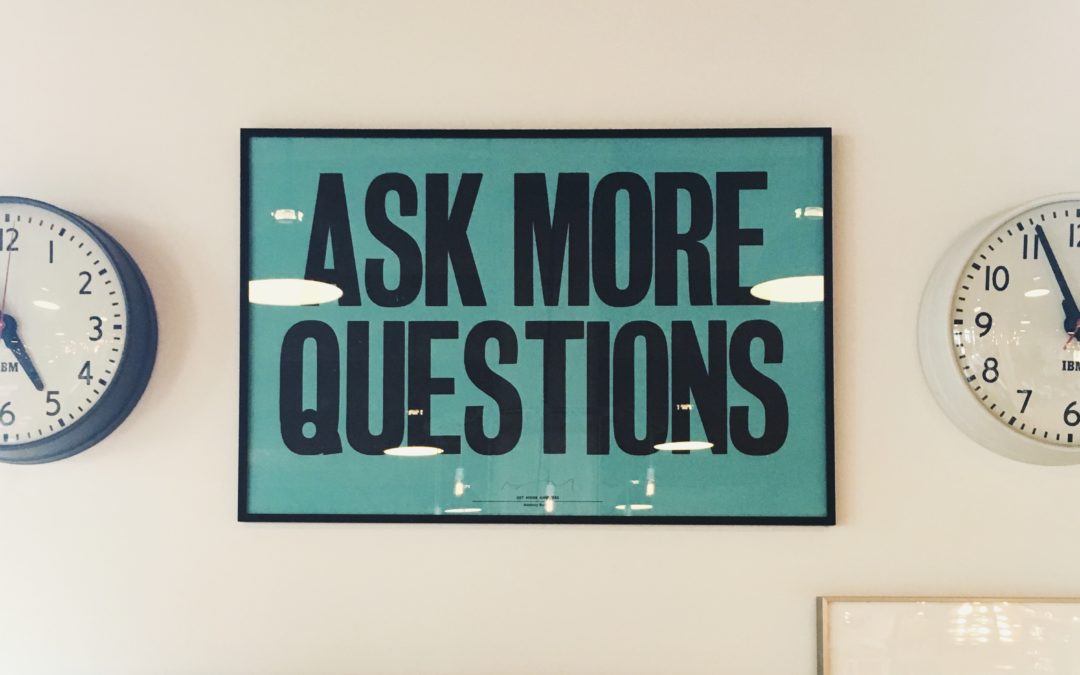
by Connor Laubenstein | Aug 10, 2016 | Advertising, Digital Marketing, General, Posts, Public Relations, Resources, Social Media
As a recent college graduate, I am no stranger to the anxiety of the job hunting process. A lot is left to chance – the current market in your field, catching employers when they need help, and making the right connections. At the end of the day, timing dictates all, and speaking from experience, it can be fickle.
But say the timing works in your favor – you’ve shot your résumé and cover letter to a million offices, you painstakingly wait for just one drop in the bucket, and finally, after what feels like an eternity, you get a pinging notification in your email inbox: “Hello, we have reviewed your submitted materials, and we would like to continue your application for this position with an interview.”
You find yourself overcome with joy at the opportunity to prove yourself to your hopeful future employer. You respond immediately to schedule your meeting, and you send a couple crazed texts to your closest friends (and your Mom) accounting your elation. You open your sliding glass door to the back porch, and twirl in the mid-morning air with the elegance of Snow White, greeting the world as a person who is soon to be employed. But then you stop twirling. The mid-morning air suddenly leaves a chill on your skin. You feel a pit beginning to grow in your stomach.
Why are you experiencing this rollercoaster of emotions? You remember that you do not, in fact, have a job yet. There is one more hurdle to bound, and it is a tall one. You have to actually show up to that meeting that you just scheduled and answer interrogative questions about yourself, proving your worth. Suddenly your excitement turns back to anxiety at the thought of committing a verbal miscue, not being prepared, or forgetting to wear pants.
Interviewing is a challenge, and like most challenges, it requires practice. Not all of the process is out of your control, though. Here are a few things to keep in mind for before, during, and after your interview, to leave you with a better chance at soothing that apprehension, and pinning down that job.
Pre-Interview
Everybody’s Got Goals
When we think about interviews, we typically make them out to be employer-centric. “I’ve got to make a good impression on them.” We assume a great deal of pressure to give the employer what we think they are looking for. But what is the employer looking for? An employee. That was easy. But more specifically, in an interview, employers evaluate candidates based on their applicable skills for the given position, and their competence to get the job done. Employers are also looking for your potential to contribute to the team, and ability to mesh with that team’s mission, philosophy, and work environment.
Just as importantly, before you walk into that office, you should take some time to think about what you want. What should you be getting out of this interview? A job. Again, easy, but more specifically? You want to figure out if the open position is right for you – does the position strike a balance between your interests and the tasks that will be required of you? To what degree will you be given responsibilities and challenges? Is there any potential for growth within the company or further education? Finally, such as is the goal of the employer, will you be able to mesh with the team’s mission, philosophy, and work environment.
Do Your Homework
If you’ve been given an interview, then you’ve probably already done some degree of research on the company. Good! Now do more! There is absolutely no such thing as being too prepared for an interview. Whether it be committing the client list to memory, learning the company’s history, or noting the specific language that the company uses on its website, going into an interview with anything that shows that you’ve done research will boost your credibility, demonstrating your willingness to work diligently and thoughtfully.
In addition to reading what the company has to say, look at outside sources. Reading employee reviews, the company’s Better Business Bureau listing, and inputting a simple Google search can be incredibly informational and will give you a better idea of how to approach your interview.
It might sound silly, but do your homework on yourself. In the interview, you’ll be doing most of the talking, and you want to have concrete topics to address, rather than being caught off guard and having to scramble to get back on your feet. For instance, citing examples of work that you’ve done, or team projects you’ve participated in will show the interviewer your attention to detail and your ability to work in groups. Anticipate questions that the interviewer will ask you, and come up with talking points that you can integrate. Finally, make sure that the information on your résumé is up to date.
This should go without saying, but make sure that you aren’t blatantly lying about any experience or qualifications that you have.
During the Interview
Relax. Breathe.
The time has come! You’ve gotten to the office (early) and you’re putting your car in park. But before you turn off your pump-up music and walk into the office, remember this: as soon as you open the door, the interview has begun. Treat every interaction that you have from the parking lot to the office door as if they’re evaluations of your professionalism. If you should so happen to take public transportation to your interview, try not to swear at anybody.
Now. With that said. Relax. You’re in this position for a reason. If you get any last minute apprehension, harness it. Keep in mind that somebody offered you that interview. If the company didn’t think that you were cut out for the job, they wouldn’t be talking to you. The most important thing to keep in mind throughout the interview is that both of you have goals, and in order to accomplish them, both parties must be honest and clear. All that’s left is to remember your talking points and present a good case for yourself.
Ask
Alright. You’ve talked about yourself extensively, and now it’s the interviewer’s turn. They ask, “Do you have any questions for me?”. Yes, please have some questions prepared for your interviewer. It sure won’t look very professional if they ask you for questions and you respond “Nope,” and walk out the door, thinking that you know everything about the company. This is your time to see how prepared they are. How do they view their company, along with their place in it? It’s important to keep these questions fairly open-ended, with room for them to elaborate. Questions like “What direction would you say the company is heading?”, “What separates you from your competitors?”, or “What does a typical day here look like?” show that you’re genuinely interested in being a part of their team.
The final questions that you ask should direct the conversation back to you. Allow the interviewer to share their feelings about your candidacy on the spot. Start with a general question, like “What is the next step for me in the application process?”, or “Is there any other additional information or materials that I can provide?”. These will remind the interviewer that you will go beyond what is necessary to get the position.
Finally, it’s time to throw down the hammer. Get the last question out there. “Do you have any reservations about myself as a candidate for this position?”. It might seem heavy handed, or a bit blunt, but it’s meant to. Not only will you hear candidly what the interviewer thinks about you, but you will appear confident, giving yourself a final chance to quell any doubt that you’re the one for the job.
Post-Interview
The Interview is Over, But You’re Not Done
You shake hands goodbye, and walk out the door. Remember – just as it started, the interview isn’t over until you get into your car and drive away. But even then, amidst your excitement about how well the interview went, there is still work to be done. It’s no secret that the people who jump off the page, or go the extra mile are more likely to be chosen for a job. So make it easier on yourself – go the extra mile! One or two days after the interview, send your interviewer a personal email thanking them for taking the time to talk to you. Let them know that you are still keen on securing the position, and that you would make a good asset to their team.
Here’s a tip that’ll garner you some extra brownie points, free of charge: hand write that note, drive back to the company’s office, and hand deliver it to its recipient.
While much of finding a job comes down to some form of luck, the trick is to control what you’re able to control. Committing to doing your research, reminding yourself that you deserve the opportunity, and going the extra mile put you in a much better position for landing that job you want. That, paired with good timing, will result in Snow White twirls – I promise.


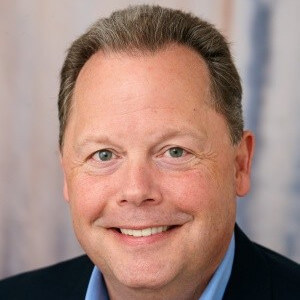

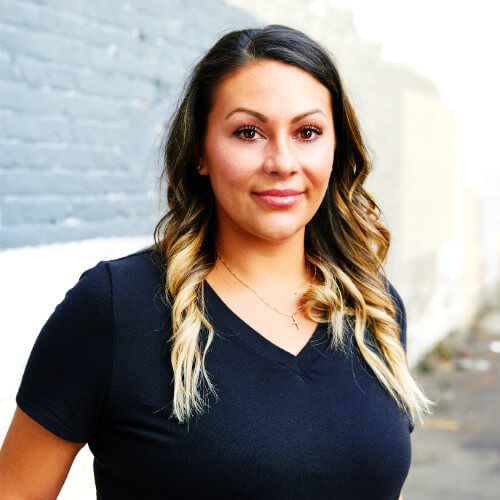
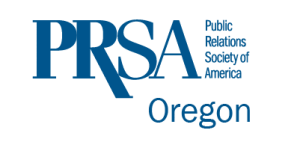

![Mac Prichard of Mac’s List [Podcast]](https://www.veracityagency.com/wp-content/uploads/Macs-List-PR-Talk.jpg)

![PR Talent’s Dan Lee [Podcast]](https://www.veracityagency.com/wp-content/uploads/Dan-Lee-PR-Talk-on-PR-Talk-Podcast.jpg)





 As I am preparing for my first term back at college as a
As I am preparing for my first term back at college as a

